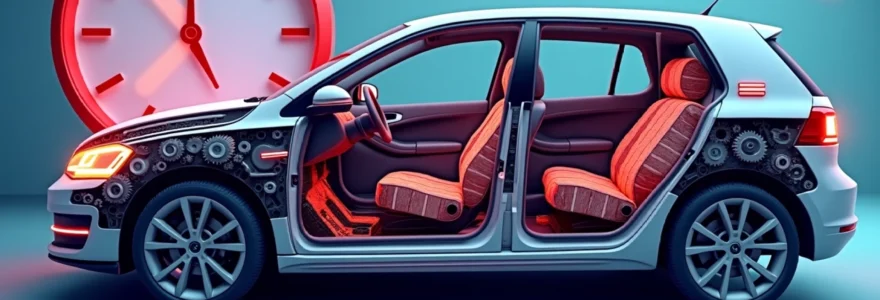Regular car maintenance is crucial for keeping your vehicle running smoothly and efficiently. However, many car owners underestimate the importance of following their vehicle's maintenance schedule, often leading to severe consequences. Neglecting routine check-ups and services can result in a cascade of problems, from minor issues to major failures, ultimately costing you significantly more in the long run.
Engine degradation: from minor issues to major failures
The engine is the heart of your vehicle, and neglecting its maintenance can lead to a host of problems. Regular oil changes, filter replacements, and tune-ups are essential for keeping your engine in top condition. When these routine services are skipped, the engine's components begin to wear down more quickly, leading to decreased performance and efficiency.
One of the most common issues resulting from neglected engine maintenance is oil sludge buildup. As oil ages and collects contaminants, it can form a thick, sticky substance that clogs vital engine parts. This sludge can restrict oil flow, leading to increased friction and heat, which can cause premature wear on engine components.
Moreover, failing to replace air filters can result in decreased fuel efficiency and engine performance. Dirty air filters restrict airflow to the engine, causing it to work harder and consume more fuel. Over time, this can lead to more serious issues, such as damaged fuel injectors or a compromised catalytic converter.
Neglecting engine maintenance is akin to ignoring a ticking time bomb. What starts as a minor issue can quickly escalate into a catastrophic failure, potentially leaving you stranded and facing a hefty repair bill.
Suspension and steering system complications
Your car's suspension and steering systems play crucial roles in providing a smooth ride and ensuring proper vehicle control. Skipping maintenance on these components can lead to a range of issues that not only affect your driving experience but also compromise your safety on the road.
Ball joint wear and premature failure
Ball joints are essential components that connect your car's suspension to the wheels. They allow for smooth movement and help maintain proper wheel alignment. When ball joints are not regularly inspected and lubricated, they can wear out prematurely, leading to excessive play in the suspension system.
This wear can cause uneven tire wear, poor handling, and in severe cases, complete ball joint failure. A failed ball joint can cause the wheel to separate from the vehicle, resulting in a loss of control and potentially catastrophic accidents.
Shock absorber deterioration and safety risks
Shock absorbers are crucial for maintaining proper vehicle stability and ride comfort. They work by dampening the movement of your car's springs, preventing excessive bouncing and swaying. When shock absorbers are neglected, they can lose their effectiveness over time, leading to a host of problems.
Worn shock absorbers can result in increased stopping distances, poor handling in corners, and excessive body roll. This not only affects your driving comfort but also significantly compromises your vehicle's safety, especially in emergency maneuvers or adverse weather conditions.
Tie rod end damage and steering instability
Tie rod ends are critical components of your car's steering system, connecting the steering rack to the wheels. They play a vital role in translating the movement of the steering wheel to the actual turning of the wheels. When tie rod ends are not regularly inspected and maintained, they can wear out or become loose.
Damaged or worn tie rod ends can cause steering wandering, uneven tire wear, and in severe cases, complete steering failure. This can lead to a loss of control over the vehicle, posing a significant safety risk to you and other road users.
Control arm bushing breakdown and alignment problems
Control arm bushings are rubber components that help isolate the vehicle's frame from road vibrations and allow for smooth suspension movement. Over time, these bushings can deteriorate, especially if not regularly inspected and replaced when necessary.
Worn control arm bushings can lead to alignment issues, causing your vehicle to pull to one side or exhibit uneven tire wear. This not only affects your driving experience but can also result in premature tire replacement and increased fuel consumption due to increased rolling resistance.
Transmission neglect and its cascading effects
The transmission is a complex system responsible for transferring power from the engine to the wheels. Neglecting transmission maintenance can lead to severe and costly issues that can significantly impact your vehicle's performance and longevity.
Torque converter failure in automatic transmissions
In automatic transmissions, the torque converter plays a crucial role in transferring power from the engine to the transmission. Regular transmission fluid changes are essential for keeping the torque converter functioning properly. When this maintenance is neglected, the fluid can become contaminated or low, leading to increased friction and heat buildup within the torque converter.
A failing torque converter can cause slipping, shuddering, and even complete transmission failure. The cost of replacing a torque converter can be substantial, often running into thousands of dollars, making it a prime example of how skipping maintenance can lead to expensive repairs.
Clutch wear acceleration in manual gearboxes
For manual transmissions, the clutch is a critical component that requires regular inspection and adjustment. Neglecting clutch maintenance can lead to premature wear and reduced performance. A worn clutch can slip, making it difficult to change gears smoothly and efficiently.
Replacing a clutch is a labor-intensive process that can be quite costly. By maintaining your clutch properly, you can extend its lifespan and avoid the inconvenience and expense of premature replacement.
Transmission fluid degradation and gear damage
Transmission fluid plays a vital role in lubricating and cooling the various components within the transmission. Over time, this fluid can break down and become contaminated, losing its ability to protect the transmission effectively. Neglecting to change the transmission fluid at recommended intervals can lead to increased wear on gears, bearings, and other internal components.
As these components wear down, metal particles can contaminate the fluid further, creating a cycle of accelerated wear. This can ultimately result in gear damage, shifting problems, and even complete transmission failure, necessitating costly repairs or replacement.
CVT belt and pulley system deterioration
Continuously Variable Transmissions (CVTs) rely on a system of belts and pulleys to provide seamless power delivery. These components require specific maintenance to function properly. Neglecting CVT maintenance can lead to belt wear, pulley damage, and reduced transmission efficiency.
CVT repairs can be particularly expensive due to the specialized nature of these transmissions. Regular fluid changes and inspections are crucial for maintaining the health of your CVT and avoiding costly repairs down the line.
Brake system deterioration and performance decline
Your vehicle's brake system is arguably its most critical safety feature. Neglecting brake maintenance not only compromises your safety but can also lead to expensive repairs and replacements. Regular brake inspections, pad replacements, and fluid changes are essential for maintaining optimal braking performance.
When brake maintenance is neglected, several issues can arise. Brake pads can wear down to the point where they damage the rotors, necessitating expensive rotor replacement. Brake fluid can become contaminated, leading to reduced braking efficiency and potential system failure. In severe cases, neglected brakes can lead to complete brake failure, putting you and others at serious risk on the road.
Maintaining your brake system is not just about preserving your vehicle; it's about ensuring the safety of everyone on the road. Regular brake maintenance is an investment in both your car's longevity and your personal safety.
Electrical system failures and modern car complexities
Modern vehicles rely heavily on complex electrical systems to manage everything from engine performance to safety features. Neglecting the maintenance of these systems can lead to a range of issues, from minor inconveniences to major malfunctions.
Battery sulfation and premature replacement
Your car's battery is the heart of its electrical system. Regular maintenance, including keeping the terminals clean and checking the charge level, is crucial for battery health. When battery maintenance is neglected, sulfation can occur, which is the buildup of lead sulfate crystals on the battery plates.
Sulfation reduces the battery's capacity and ability to hold a charge, leading to premature failure. Replacing a car battery more frequently than necessary due to poor maintenance can become a significant expense over time.
Alternator overload and charging system breakdown
The alternator is responsible for keeping your battery charged and powering your car's electrical systems while the engine is running. When other electrical components are not properly maintained, it can put additional strain on the alternator, causing it to work harder and wear out faster.
For example, a failing battery can cause the alternator to overwork, trying to maintain a charge. Similarly, faulty electrical components can draw more power than necessary, further straining the charging system. Replacing an alternator can be a costly repair, often requiring several hours of labor in addition to the part itself.
Starter motor wear and cold start failures
The starter motor is crucial for initiating the engine's operation. Regular maintenance of the starting system, including checking and cleaning electrical connections, can help ensure reliable starts. Neglecting this maintenance can lead to increased wear on the starter motor and potential failure.
A failing starter motor can leave you stranded, often at the most inconvenient times. Replacing a starter motor can be expensive, especially on modern vehicles where access to the component may be limited, requiring additional labor hours.
ECU malfunctions due to sensor neglect
Modern vehicles rely on a network of sensors to provide data to the Engine Control Unit (ECU). These sensors monitor various aspects of the engine's performance and help optimize fuel efficiency and power output. When sensors are not maintained or replaced as needed, they can provide inaccurate data to the ECU.
This can result in poor engine performance, decreased fuel efficiency, and even engine damage in severe cases. Diagnosing and replacing faulty sensors can be a complex and expensive process, especially if multiple sensors are involved or if the ECU itself has been damaged due to prolonged exposure to faulty sensor data.
Fuel system issues and efficiency loss
The fuel system is responsible for delivering the right amount of fuel to your engine for optimal performance. Neglecting fuel system maintenance can lead to decreased efficiency, poor performance, and potentially expensive repairs.
Regular maintenance tasks such as replacing fuel filters, cleaning fuel injectors, and using quality fuel can help prevent many common fuel system issues. When these tasks are neglected, problems can arise such as clogged fuel injectors, damaged fuel pumps, and contaminated fuel lines.
A poorly maintained fuel system can significantly impact your vehicle's fuel efficiency, costing you more at the pump and potentially leading to more serious engine problems over time. In severe cases, fuel system issues can cause engine misfires, stalling, and even complete engine failure, resulting in costly repairs or replacement.
Moreover, neglecting to address minor fuel system issues can lead to a buildup of harmful deposits in your engine, further compromising its performance and longevity. Regular fuel system maintenance not only helps maintain your vehicle's efficiency but also prevents the accumulation of these harmful deposits, saving you money on both fuel costs and potential repairs.
By staying proactive with your vehicle's maintenance schedule, you can avoid the costly consequences of neglect. Regular servicing may seem like an expense, but it's an investment in your vehicle's longevity, performance, and safety. Remember, the cost of routine maintenance is often far less than the price of major repairs caused by neglect. Keep your car running smoothly and efficiently by adhering to its recommended maintenance schedule, and you'll enjoy a safer, more reliable, and ultimately more cost-effective driving experience.

